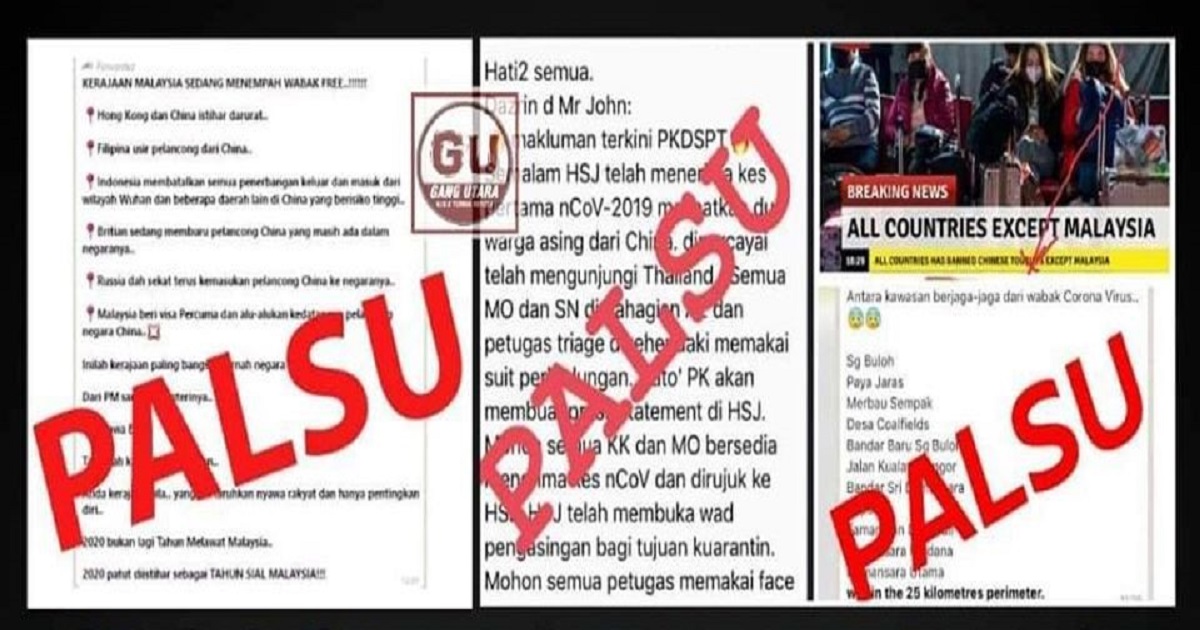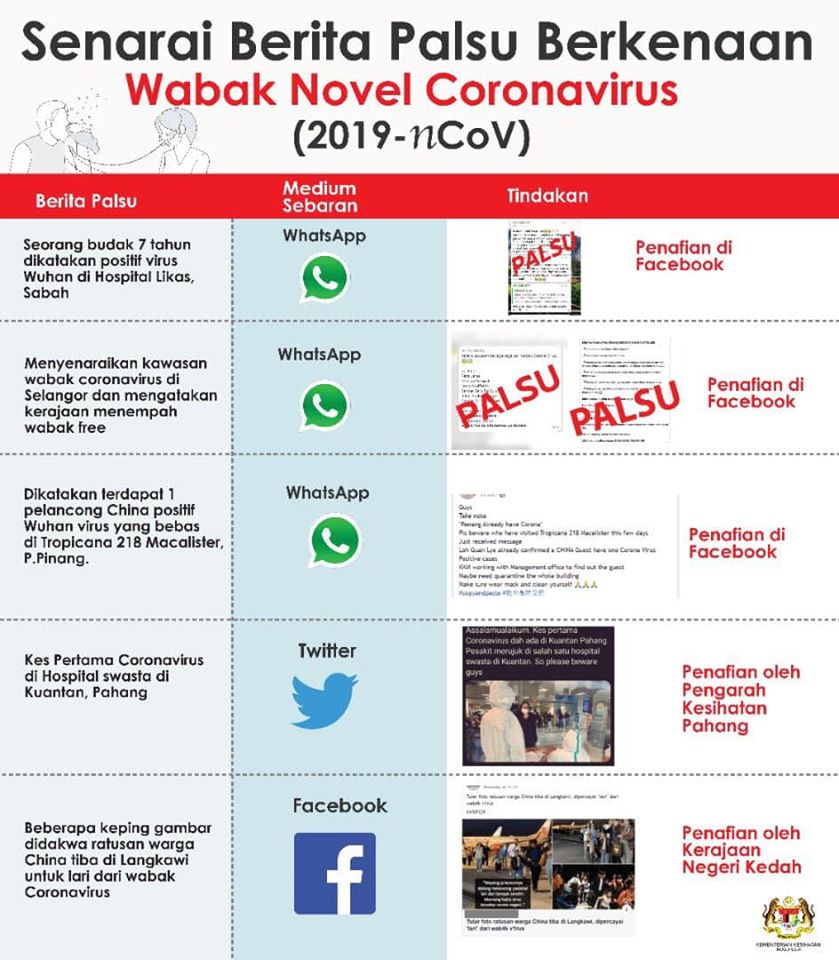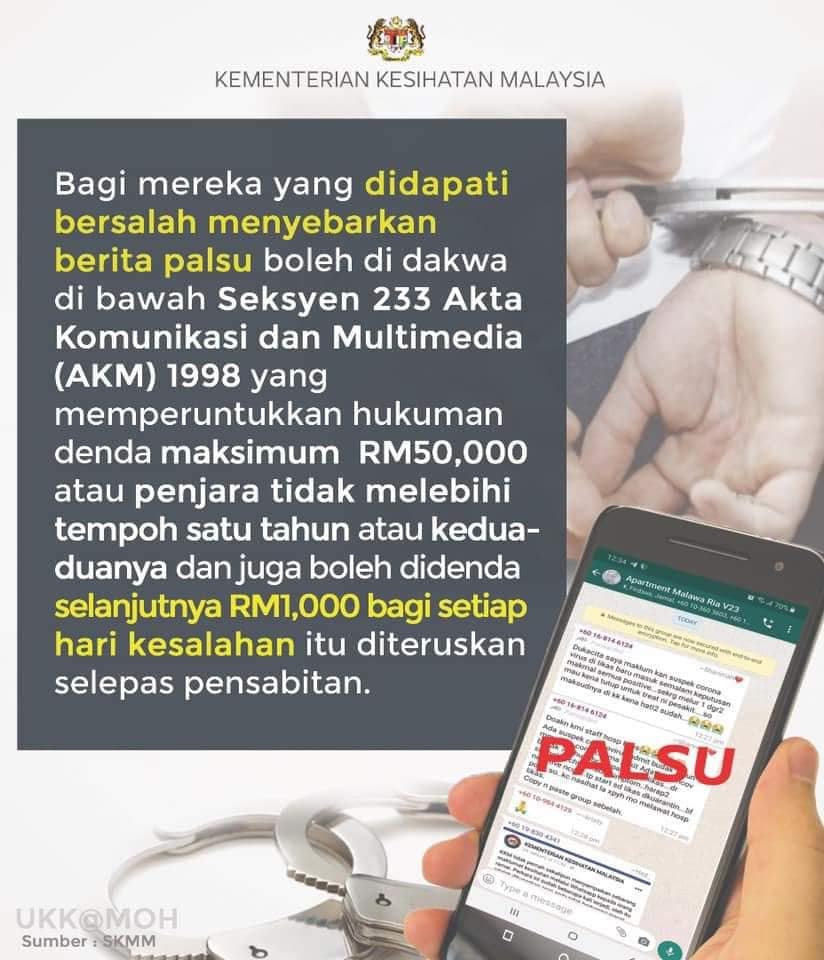|
View: 2565|Reply: 14
|
Sebar Berita Palsu Koronavirus, 5 Pemilik Akaun Media Sosial Disiasat
[Copy link]
|
|
|
 Maklumat palsu berkaitan koronavirus yang tular dalam media sosial. Kredit foto: Facebook
Empat akaun Facebook dan satu kumpulan WhatsApp disiasat oleh polis berhubung penularan berita palsu tentang wabak koronavirus di Malaysia.
Memetik laporan mStar Online, empat akaun Facebook itu adalah Mr Kong Tuck Wah, Ibu Yati, Roti Sardeen dan Gabungan Anak Terengganu (Original).
Manakala, kumpulan WhatsApp yang tidak dinamakan itu dipercayai menyebarkan berita palsu tentang kematian mengejut banduan di penjara Sandakan, Sabah kononnya akibat koronavirus.
Pengarah Jabatan Siasatan Jenayah (JSJ) Bukit Aman, Datuk Huzir Mohamed menjelaskan, kertas siasatan dibuka terhadap laman Facebook Mr Kong Tuck Wah di bawah Seksyen 203 (A) Kanun Keseksaan (Pendedahan Maklumat).
 Kredit foto: Facebook
Sekiranya sabit kesalahan, pemilik akaun Facebook tersebit boleh dikenakan hukuman denda maksimum RM1 juta atau penjara maksimum setahun atau kedua-duanya sekali.
Tiga akaun Facebook yang lain disiasat berikutan memuat naik kenyataan yang boleh menggugat ketenteraman awam.
"Kes disiasat di bawah Seksyen 505 (b) Kanun Keseksaan (Menyebabkan ketakutan atau kegentaran awam atau kepada mana-mana golongan awam) yang memperuntukan hukuman penjara sehingga dua tahun atau denda atau kedua-duanya," katanya.
 Kredit foto: Facebook
Kelima-lima kes berkenaan turut disiasat dibawah Seksyen 233 Akta Komunikasi dan Multimedia 1998 (pengunaan tidak wajar kemudahan rangkaian) yang memperuntukkan hukuman denda maksimum RM100,000 atau penjara maksimum setahun atau kedua-duanya.
" olis juga tidak akan teragak-agak untuk mengambil tindakan terhadap mana-mana individu yang didapati dengan sengaja mensensasikan isu berkait virus ini," katanya. olis juga tidak akan teragak-agak untuk mengambil tindakan terhadap mana-mana individu yang didapati dengan sengaja mensensasikan isu berkait virus ini," katanya.
Semak dahulu kesahihan maklumat yang diterima dan jangan sewenang-wenangnya menyebarkan maklumat yang boleh mencetuskan panik dalam kalangan masyarakat. - CARI |
Rate
-
1
View Rating Log
-
|
|
|
|
|
|
|
|
|
|
|
|
hari ni terima lagi benda bodoh kat wasap. yg konon kes kat bentong pahang.siap ada record suara lagi.taktau nak maki sapa.. yg yg share atau yg mulakan.. |
|
|
|
|
|
|
|
|
|
|
|
|
Kenapa ye ada jenis org yg suka reka cerita palsu camni? Apa yg dorang dapat eh? Tak faham aku |
|
|
|
|
|
|
|
|
|
|
|
yang tu semua baca pun boleh tau sgt obvious fake
|
|
|
|
|
|
|
|
|
|
|
|
alesandra: hari ni terima lagi benda bodoh kat wasap. yg konon kes kat bentong pahang.siap ada record suara lagi.taktau nak maki sapa.. yg yg share atau yg mu ...
Bagi je link artikel ni kat dia.
|
|
|
|
|
|
|
|
|
|
|
|
alesandra: hari ni terima lagi benda bodoh kat wasap. yg konon kes kat bentong pahang.siap ada record suara lagi.taktau nak maki sapa.. yg yg share atau yg mu ...
Bagi je link artikel ni kat dia.
|
|
|
|
|
|
|
|
|
|
|
|
|
Buat apa lah segelintir orang sebarkan berita yang tak berapa sahih. Jadilah netizen yang bijak sikit. Kan dah terperangkap dengan masalah dan dikehendaki polis. |
|
|
|
|
|
|
|
|
|
|
|
|
Yang sebar janji palsu masa pru14 dulu tak kena siasat ke? |
|
|
|
|
|
|
|
|
|
|
|
|
hurm banyak sangat..lagi2 yg share2 kat whatsaap tu baca macam angin lalu je |
|
|
|
|
|
|
|
|
|
|
|
papadomku replied at 30-1-2020 11:39 AM
Kenapa ye ada jenis org yg suka reka cerita palsu camni? Apa yg dorang dapat eh? Tak faham aku
Saiberteruper umno bnpas punya keja ni colanfirm lah |
|
|
|
|
|
|
|
|
|
|
|
Bodo
yang sebar manifesto palsu tak ambik tindakan pulak
siap bayar gaji menteri ribu2
bodo |
|
|
|
|
|
|
|
|
|
|
|
zacks replied at 30-1-2020 05:48 PM
Saiberteruper umno bnpas punya keja ni colanfirm lah
PH bodoh kuat kencing |
|
|
|
|
|
|
|
|
|
|
|
|
aku x faham konsep rajin nak pass2 cite yg takde ujung pangkal. |
|
|
|
|
|
|
|
|
|
|
|
HELPFUL RUMORS
China’s top court says it was a mistake to quell early “rumors” about the Wuhan virus
January 31, 2020
Tripti Lahiri
Jane Li
By Tripti Lahiri & Jane Li
FROM OUR OBSESSION
Because China
Even small changes in China have global effects.
China’s Supreme People’s Court has often been at the forefront of the country’s crackdown on “rumors.” In 2013, it introduced sentences of three years for “libelous” posts, including those deemed to be “damaging the national image.” Now, in the midst of the coronavirus outbreak, it’s sending a more tempered message.
Chinese newspaper Beijing News this week (link in Chinese) published the story of a local doctor who said he had been summoned by Wuhan police because of information he shared in a medical school alumni group on Dec. 30. He had told the group there were seven cases of pneumonia in a hospital from SARS, a virus that caused an epidemic in China in 2003. He later clarified that the virus in question was still being identified, according to the South China Morning Post. Police made the doctor sign a letter promising not to disclose further information about the outbreak, the Post said, adding that the doctor later became infected himself. On Dec. 31, the city disclosed the presence of 27 pneumonia cases of unknown origin.
On Tuesday (Jan. 28), an article by a judge published on the top court’s social media account (link in Chinese) noted that if law enforcement hadn’t been so quick to take action to quell those rumors, China might be in a better position in its battle against the new virus. The virus has infected (link in Chinese) more than 9,700 people in the country—more than SARS—and killed at least 213. The article said that while some of the information in the messages about the pneumonia cases was inaccurate, on the whole the information was not a fabrication:
If the public listened to this ‘rumor’ at that time, and adopted measures such as wearing a mask, strict disinfection, and avoiding going to the wildlife market based on panic about SARS, this may have been a better way to prevent and control the new pneumonia … As long as the information is basically true, the publishers and disseminators are not intentionally malicious, and the behavior objectively has not caused serious harm, we should maintain a tolerant attitude towards such ‘false information.’
While not a ruling or an official statement, the article offers clues to the court’s thinking on the topic.
Before the court weighed in, Wuhan authorities hadn’t disclosed what sort of rumors they had taken action against. But after the court’s article, Wuhan police said on social network Weibo (link in Chinese) on Wednesday (Jan. 29) that they had received complaints about misinformation after the city announced the outbreak. Police said they summoned the people in the group because they referred to the cluster of pneumonia cases as being SARS, which was false, and discussed the matter with them but didn’t punish or fine them. The current outbreak was identified on Jan. 7 as a new type of coronavirus, making it a member of the SARS family, but distinct from the strain that caused nearly 800 deaths in 2003.
On social media, many have noted with anger that the Wuhan police announced they had taken action against pneumonia rumors at a time when the city should have been entirely focused on warning and protecting residents. Earlier this month, a lawyer wrote on Weibo that it was “chilling” that “the government now thinks citizens who exchange information that they cannot necessarily verify are the same as those who intentionally spread rumors.” The commentary was shared 5 million times before being deleted.
The top court said that information disclosure is the “cure” for dealing with the situations in which rumors arise, while law enforcement action just treats the “symptoms.” It also tacitly acknowledged what many in China believe—that so-called rumors are often quashed for being inconvenient or for touching on politically sensitive matters, rather than for being untrue:
Rumors are stopped by transparency. Based on their anxiety about their own safety, there is a certain degree of panic in the face of public health emergencies, which is normal and should be understood. If, at such a moment, relevant information is made public in a timely and comprehensive manner, people’s doubts will naturally be reduced. However, if the information is not disclosed in a timely and transparent manner, it is often easy for the masses to listen to and spread various rumors based on their social interaction circles and their own life experiences… if the rumors are repeatedly confirmed by reality, the masses will naturally choose to believe the rumors in the face of emergencies.
Many have noted that the government in Beijing seems to be quite happy to direct rising public anger at local authorities in central Hubei province. Wuhan mayor Zhou Xianwang said in a TV interview this week that that he didn’t disclose information about the virus in a timely manner, adding that he needed authorization from higher up to do so. A health commission chief in another city in the province with a high number of infections was fired yesterday, after the state-run broadcaster aired footage of her stumbling over questions about availability of beds and test kits.
The court’s criticism of the Wuhan police’s handling of rumors may just be the latest example of deflecting anger. Meanwhile, it made it clear that the court still considers many kinds of rumors actionable. Deliberately sharing inflated numbers of deaths in order to sow panic, or “recklessly” casting aspersions on the national government’s handling of epidemics, should be punished as criminal offenses, the judge wrote.
|
|
|
|
|
|
|
|
|
|
| |
|